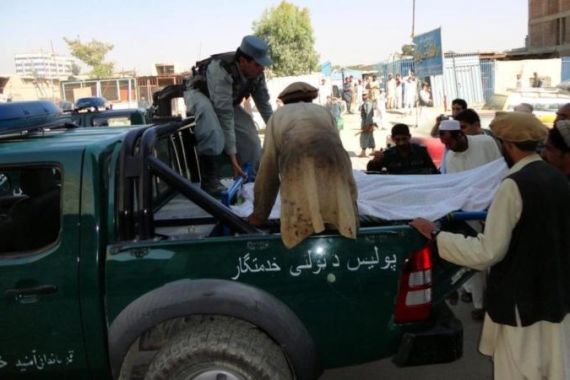Afghan police killed in deadly blast
At least six deaths in country’s south reported as NATO ministers gather in Belgium to discuss future of the war.

At least six Afghan policemen have been killed by an explosion in the country’s south, amid a meeting of NATO defence ministers in Belgium to discuss the next phase of the war on Afghanistan.
Mohammad Ibrahim, the police chief in Nad Ali district of Helmand province, said the blast on Wednesday morning occurred when the policemen’s vehicle ran over a roadside bomb.
The officers, part of a US-sponsored community force known as the Afghan Local Police (ALP), were patrolling in Nad Ali, a restive town in the province of Helmand when hit by the blast, the official said.
“It was a roadside bombing. It hit a local police vehicle and killed six policemen. The bomb was planted by the Taliban,” Ibrahim said.
He said the bombing was in retaliation for recent operations by the ALP against the Taliban fighters.
Police are coming under increasing attack from the Taliban as Afghan security forces take on a greater role in countering the fighters ahead of a withdrawal of NATO troops in 2014.
NATO defence ministers met in Belgium on Wednesday to deliberate the next phase of the Afghanistan war and to hear how military commanders plan to curb the insider attacks that have killed or injured 130 allied forces.
Plans to reduce attacks
Officials were expected to formally announce that the top US commander in Afghanistan, Marine General John Allen, would be the next NATO supreme allied commander.
Allen is slated to take over early next year, and Marine General Joseph Dunford, the assistant Marine commandant, will take the top Afghanistan job.
During the meeting, Allen and Leon Panetta, US defence secretary, planned to assure the ministers that commanders have come up with a range of ways to reduce the insider attacks in which Afghans have turned their guns on allied forces.
This meeting came a day after the UN Security Council extended authorisation for the NATO-led force for a year and welcomed the agreement to gradually transfer full responsibility for security in the country to the Afghan government by the end of 2014.
A resolution adopted unanimously by the council welcomed the government’s “strong commitment” to develop a national security force under civilian leadership that can contribute to the region’s security by stabilising the situation in Afghanistan.
The UN’s most powerful body expressed serious concern at the current security situation in Afghanistan and stressed that many challenges remain.
The Security Council had tentatively scheduled a trip to Afghanistan in late October, but diplomats said it has been delayed partly because of security concerns.